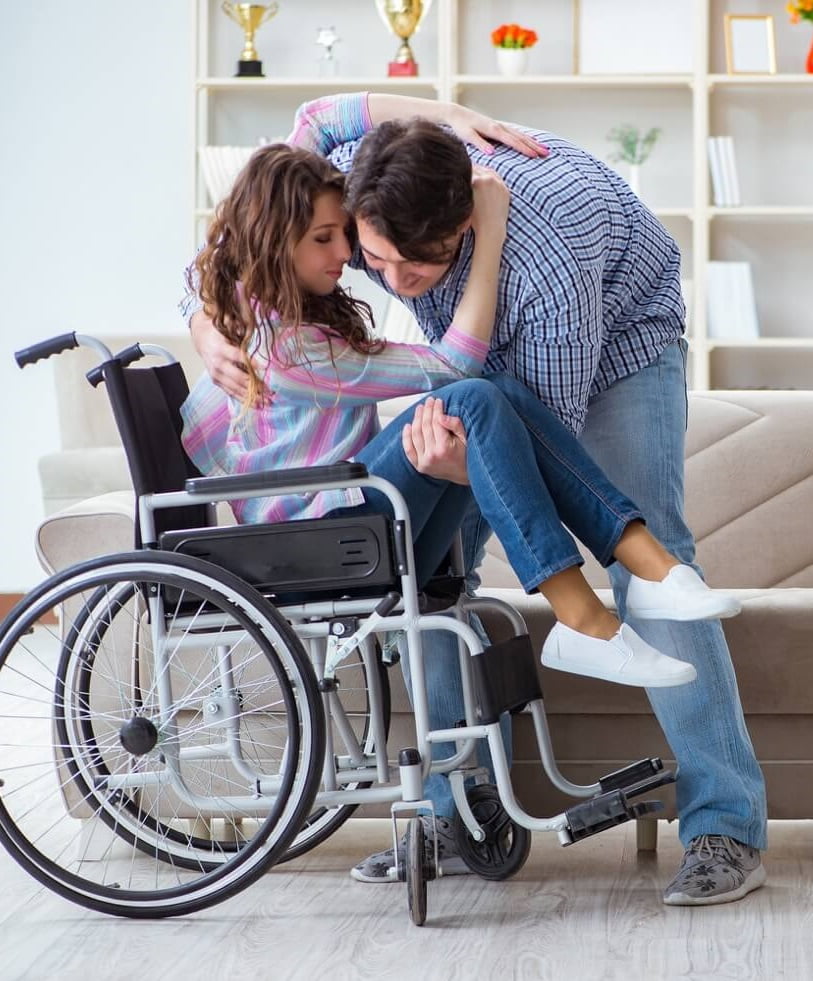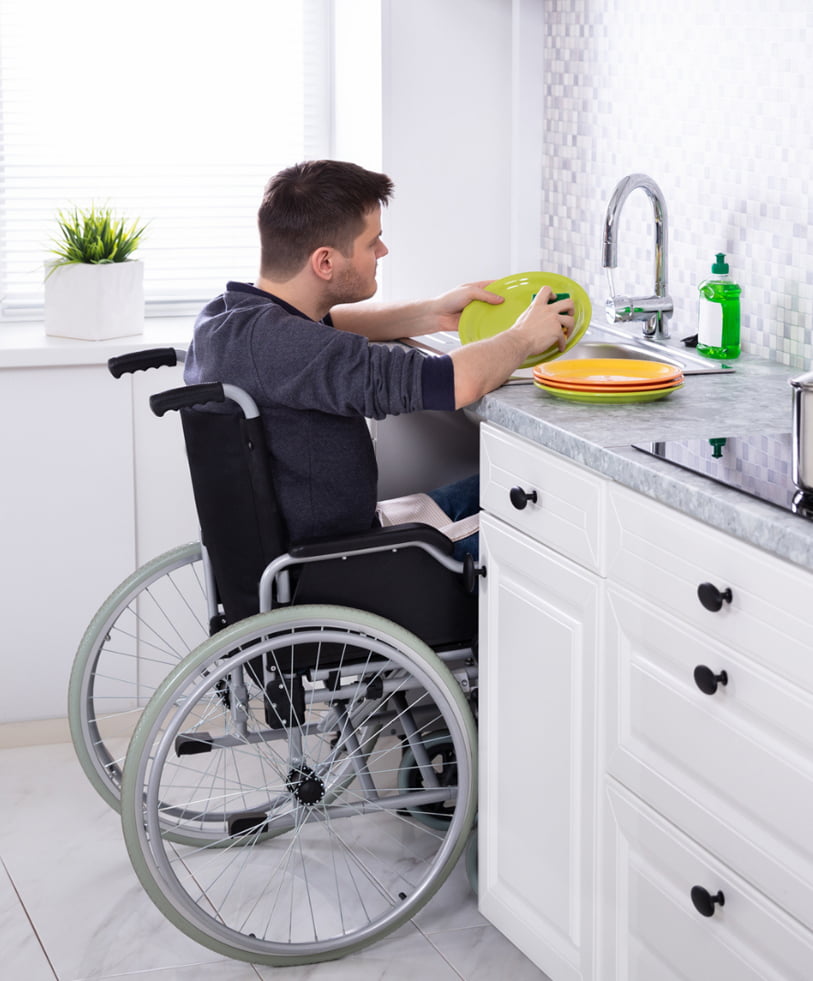Accommodation
AEG Foundation is passionate about providing long term supported disability accommodation
Short Term Accommodation (STA)
AEG Foundation provides short-term accommodation to adults, children and young people receiving services under the NDIS. Short Term Accommodation (STA) allows participants to continue to have their support needs to be met in planned or unplanned situations.
AEG Foundation takes great pride in delivering positive and meaningful experiences to participants in our services that are tailored to your individual needs and goals. Your supports can be delivered flexibly from your core support budget under the NDIS, with a wide range of options including:
- Choice of service delivery and times
- In or out of home respite
- Community participation or other activities
- Social and Recreational activities
- Group respite with peers
- Cultural activities and support
- We can provide overnight, short-term placement or daytime respite with experienced and friendly staff
Supported Independent Living (SIL)
AEG Foundation provides Supported Independent Living (SIL) accommodation to adults with a disability to live in a home-like environment. Supported Independent Living is an NDIS support that can be provided in a shared home or single living environment. SIL accommodation can support you to:
- Retain your independence or become more independent
- Develop your living skills
- Shape and achieve your goals
- Access the community
- Assist with daily living skills
- Live life the way you choose
Each person in our accommodation receives a range of services specific to their individual needs that may include:
- Personal care and assistance with daily living
- Assistance with medication, health or medical appointments
- Support to access leisure and recreational opportunities
- Cooking and preparing meals
- Skills development inside and outside the home
- Positive behaviour supports
Individualised Living Options (ILO)
There are many options for people with disabilities to be supported in different ways in their homes through National Disability Insurance Scheme (NDIS) funding.
With so many options out there it can be hard to work out what supports you actually need, so we’ve put together some information about how you might be able to use an Individualised Living Options package (ILO) for flexible home supports.
What is Individualised Living Options support?
ILO supports help you to live alone or independently in someone else’s house but don’t include the house itself, which makes them different from Specialist Disability Accommodation (SDA).
You can have an ILO package while living in Specialist Disability Accommodation.
ILO can also be designed to teach you the skills to look after yourself so you can live as independently as possible if that’s what you need.
There are two stages to the funding, which work as part of your NDIS plan.
The first part is funding for support to find out how you want to live, where you want to live, who you want to live with, your strengths, what you can do to build your skills and the kinds of services you need, similar to Support Coordination. When this first stage is finished the person who is helping you to design your supports will create a Service Proposal with all the details the National Disability Insurance Agency (NDIA) needs to know about how you want to live.
The second part of the ILO is funding approved by the NDIA to get those services working and monitor how well they are going so they can be adjusted when necessary.
What is included in ILO?
A wide range of supports is available under ILO as the funding is designed to match the needs of each individual so that they can live the way they want. In-home supports such as help with personal care, cooking, cleaning, shopping, laundry, finances or emotional support can be included, but there are also several different types of households in which people with an ILO package can live.
A host living arrangement for example is available for adults on the NDIS who choose to live with a person or family they are not related to (a host) who gives them disability support, emotional support and help around the house. The host is paid through your NDIS plan and there is an arrangement about what kinds of support they will provide.
In exchange for their support, the host will receive financial help with paying rent and utility bills. Another option is for housemates or co-residents to live in your home and under an agreement to provide support and companionship in return for a reduced rent or payment. Supports can also include another person or a team of people, known as mentors, who you choose to spend time with to develop social skills and participate in recreational or community activities. Mentors are usually paid a salary as they can spend long periods of time providing you with direct and indirect support. Additionally, friends and family can be part of ILO, for example by providing emotional support or helping with social connection.
What are the benefits of an ILO?
These supports can be particularly helpful if you want to move out of your family home or group home. The package can be changed as your needs change and is more flexible than Supported Independent Living – which is funding most commonly used to live in shared housing – so ILO can meet a wider variety of individuals’ needs.
ILO and SIL can’t be funded at the same time but they can both provide some similar supports, like personal care and support to develop life skills. According to the NDIA, ILO is for people with disabilities over the age of 18 who need more than six hours of help at home every day (including for problem-solving or decision making), are ready to explore their home and living needs and are willing to put time and effort into designing their future home.
The first part of ILO funding, to explore living support options, can also be used by people with disabilities who are still 17 and want to start planning to move out of home as one of their NDIS goals. One of the benefits of ILO is its ability to take into account how you might like your family and friends to be part of your support and work with funded services so that all the different supports flow together.
ILO is also a good option for people who do not want to be restricted to living in areas where group homes are located as you can use the package to live anywhere. The flexibility of funding means ILO may be the best way to meet your needs and management of the funding is also flexible as you can self-manage, get help to run it from a plan manager, or it can be managed by a provider.
How to get an ILO package
You can get help from lots of places to look into an ILO package, including your local area coordinator, someone you know who has been through a similar process or a family member. If one of your NDIS goals is linked to living support that you are not getting in other ways you can fill out a Home and Living Supports Request Form to start the process of finding out if ILO is the best option for you.
The form is a way for you to provide information to the NDIA about what your situation is, your strengths, obstacles and ongoing needs. Once you have provided that information the NDIA will look at funding the first stage of the ILO so you can work with your local area coordinator or plan manager on exploring and designing your supports, then complete the Services Proposal to ask for the second stage of funding for those supports.
Specialist Disability Accommodation (SDA)
We’ve put together a guide to help you navigate SDA. SDA funding is only provided to a small proportion of NDIS participants who have extreme functional impairment or very high support needs and meet specific eligibility criteria.
SDA refers to the physical homes in which support services are delivered, not the support services themselves. Supports are assessed and funded separately by the NDIS and known as Supported Independent Living (SIL) costs. Eligibility for SDA funding is considered at the time of plan approval and plan review. If approved, it will appear under Capital Supports in your NDIS Plan.
The funding covers the cost of a person’s home so that they can live and receive their day-to-day supports. Importantly, it allows people with disability to remain integrated into the community. SDA gives people with disability a choice about their housing environment, ensuring they receive the right support and housing design for them, including lighting, access spaces and amenities.
For example, if you have an acquired brain injury, sensory or intellectual disability or complex mobility issue, SDA can ensure you receive the support you require, in a house that is suited to your needs.
Frequently Asked Questions (FAQs)
What is SIL?
- SIL stands for Supported Independent Living, and it is paid to the organization that provides your staff support when you receive 24/7 support in a home.
- Funded individually to each person according to their need.
- Shared living arrangements of 2-7 participants.
- Assistance with daily life tasks in a group or shared living environment.
- Reflective of 24-hour care, 7 days per week.
- Three levels of support (at benchmark price).
- Cost of support does NOT include rent, board or lodging, day-to-day usual living expenses such as food and activities, personal care supports when the person is hospitalized, or items covered in other sections of the NDIS price guide (e.g. Assistive Technology or Transport Costs).
What is SDA?
- Specialist Disability Accommodation (SDA) is a payment for bricks and mortar. It is a contribution cost from the NDIA to cover additional costs to a property for specialist home modifications and maintenance. Participants pay a reasonable rent contribution (RRC) to their SDA provider.
- 25% of the Basic Disability Support Pension.
- Plus 25% of the Pension Supplement received.
- Plus 100% of any Commonwealth Rent Assistance received.
Do you need to have SIL and SDA to move in?
If you are moving to an AEG Foundation SDA registered home, you will have to be SDA eligible. SIL is required for all group home accommodation enquiries. If you are unsure if the home you are interested in requires SDA funding, please contact Abilities Enabled Group on 02 6882 7950.
Who organises the SIL and SDA funding with the NDIA?
Your direct support staff provider will liaise with the NDIA directly to arrange the SIL funding. A roster of care will be developed with your input (as well as input from any other specialists and support staff). This will then be translated into a monetary value and sent through to the NDIA as a quote. The SDA funding will be requested by your Support Coordinator. They will develop a Housing Options Report which they will submit to the NDIA. The NDIA will use this alongside a detailed Occupational Therapist report to assess your eligibility for SDA funding. Both the SIL and SDA funding requests will require additional supporting documentation. This may include (but is not limited to):
- Speech therapist reports
- Occupational therapy reports
- Physiotherapy reports
- Incident reports
- Behaviour reports
- Behaviour support plans
- Medical notes
- Specialist reports
What should I do if I want to move?
Contact your Support Coordinator or the NDIA directly and request a change of circumstances plan review meeting. The NDIA will arrange a time to come out and meet with you. At this meeting, make sure to tell the planner that you want your first goal to be finding somewhere else to live. Once your plan has been approved, get your Support Coordinator to check with the NDIA if you are SIL eligible (and SDA if required).
How do SDA payments work?
Once you have access to SDA, when you have signed a tenancy or occupancy agreement and moved into your SDA property, the NDIS will make SDA payments directly to the SDA provider. The payment is for the actual property (‘bricks and mortar’), and is paid in addition to other supports in your NDIS Plan.
For more information on SDA pricing and payments, visit the NDIS website.
What to look for in SDA?
There are many things to consider when choosing an SDA provider. Here are some useful tips:
- The owner of the property must be a registered provider with the NDIS.
- The owner of the property must be effectively managing any potential or actual conflicts of interest. Your providers must act in a way that is best for you, and give you the information you need to make good decisions about your housing.
- The property must meet relevant design requirements and be enrolled as SDA with the NDIS.
- The property you move into must match the dwelling type, design features and location funded in your NDIS Plan.
Your SDA provider will work with you to write a contract about your housing and the type, quality and price of housing supports they will provide, including ‘terms and conditions’ (rules that you agree on). This is called a tenancy or occupancy agreement.
How much rent will I pay in SDA?
Eligible participants requiring access to SDA will have funding included in their plan to cover any disability-related housing costs that are above the ordinary costs of housing and living, such as groceries, bills and rent.
You will still need to pay a ‘reasonable rent contribution’ which is:
- 25 percent of your Disability Support Pension, plus
- 100 percent of your Commonwealth Rent Assistance
What's the difference between SDA and SIL?
SDA refers to the physical homes in which support services are delivered, not the support services themselves. These supports are assessed and funded separately by the NDIS and known as Supported Independent Living (SIL) costs. Where SDA funding is usually approved for participants with extreme impairment or high support need, SIL funding is approved for participants seeking to live as independently as possible.
You may be approved for both SDA and SIL. However, they will be funded separately in your NDIS Plan. If you have both SDA and SIL funding in your plan, you can choose different providers for each. This can give you more choice and control and make sure you get the support that is best for you.
What support does SIL provide?
There are three levels of supported accommodation, depending on your needs and the number of people in the supported living setting.
- Lower needs – supervision of living arrangements and support is not usually provided 24/7.
- Standard needs – 24/7 support including assistance and/or supervision of most daily tasks and overnight sleepovers.
- Higher needs – frequent assistance to the individual with managing challenging behaviours, continual assistance with all daily tasks, management of complex medical needs such as ventilation, active support 24/7 including overnight support.
Through SIL, you have access to trained staff who can visit throughout the day or stay overnight.
Examples of SIL support include:
- Help to manage money and household budgeting
- Assistance with cooking and meal preparation
- Assistance with cleaning and laundry
- Assistance with gardening
- Help to catch public transport to visit friends and family
- Personal care such as showering and dressing
- Support with grocery shopping
- Assistance with daily skills training
- Planning and travelling to social activities
- Organising household activities
What are the benefits of SIL?
There are many benefits to receiving SIL, whether you live in shared accommodation with other NDIS participants or on your own. You are surrounded by support workers who know and understand your needs, as well as neighbours or housemates in similar situations.
Other benefits of SIL include:
- A sense of freedom and independence
- More choice and control over your daily schedule and activities
- Reducing costs like rent and electricity by sharing with others
- Living with people your own age or with similar interests
- Learning new skills and exploring new activities
How can I get SIL funding in my NDIS plan?
SIL is referred to as Assistance with Daily Living (ADL) in the NDIS Core support budget. It’s funded individually and the supports can be shared amongst everyone in a house. In your NDIS planning meeting, the NDIA will assess:
- Your goals
- How old you are
- If other supports or changes would support you better
- How independent you already are
- If you need support with tasks during most of the day
- What kinds of services offer you the best value for money
Getting SIL funding in your NDIS plan can be a long process and won’t happen overnight. This is because there are many steps involved that need to be completed by different people. The process will generally look something like this:
- An Occupational Therapist will perform an assessment to determine the level of support you require.
- Your Support Coordinator will look through the supports you currently receive to determine the level of SIL support you need.
- Your Support Coordinator will then work with you to find suitable accommodation options and a SIL provider.
- Once you choose an SIL provider, they will write a Roster of Care (RoC). This is a document providers use to work out what supports you need throughout the week. It breaks the week down into 30-minute blocks and helps SIL providers figure out how much funding you will need. You will be asked to sign the RoC once you are happy with it.
- To let the NDIS know you’d like to move into SIL accommodation, your Support Coordinator will submit a change in circumstances form to the NDIS.
- The NDIS will review all the supporting evidence, including your RoC and the SIL provider’s quote, to assess whether it’s reasonable and necessary.
- The SIL budget is released into your NDIS Plan once the NDIA approves the RoC.
How do I find a SIL home?
If you are looking to move out of home, finding the right place for you can take time. There are a few steps that need to happen and some key things to take into consideration when looking for accommodation where you will receive SIL supports.
For example, the support worker to housemate ratio needs to match the level of support outlined in your assessment. This can be anywhere from 1:1 to 1:7. Most of the time, everyone in the household will need to have similar ratios.
The house you’re looking at also needs to match the requirements outlined in the OT’s assessment. Like with any house, you will need to be compatible with the people who you are living with and vice versa.
Your Support Coordinator can work with you and your family to find SIL providers near you.
Does SIL funding pay for rent?
No. SIL funding does not cover day-to-day living expenses, items covered under other NDIS budgets (such as transport) or other supplies that aren’t related to your disability.
For example, SIL funding will not cover:
- Rent, cost of buying a house or mortgage repayments
- Electricity, phone, gas or internet bills
- Food and groceries
- Cleaning and gardening supplies
- Assistive technology
- Home repairs or maintenance
- Other day-to-day living expenses like taxis or toiletries
What if SIL is not suitable for me?
While you may require assistance with day-to-day life, such as help getting out of bed and getting ready in the morning, you may not require high-level support and 24-hour assistance.
In this case, other NDIS funded supports are available. For example, personal care supports can be funded through Assistance with Daily Living (ADL) or assistive technology might be better for you to use in your home.
A list of different home and living supports is available on the NDIS website.
Whether you prefer the independence of living by yourself or the fun of making new friends and learning new skills in shared accommodation, AEG Foundation has a range of accommodation services to support people with disabilities to find a place to call home, and build independence. Contact us to enquire about this service.



